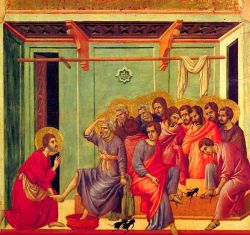A life offered freely and because of love
Jesus, the Kyrios, the Lord, washes his disciples’ feet. That’s an anomalous, paradoxical, roles inverter and scandalous gesture
On Holy Thursday, at sunset, the Easter Triduum begins. In these “holy days” separated from the other ones we, the Christian people, meditate, celebrate and live again the central mystery of our faith: Jesus goes into his Passion, knows his death and burial and the third day he is resurrected by the Father in that strength of life that is the Holy Spirit. But was this event of Jesus’ Passion due to chance or to a fate that impended over Him? Why did Jesus know a sentence, the torture and the violent death? These are questions to be answered if we want to catch and deeply understand the meaning of the Passion. And it is exactly the Gospels that want to give us this answer witnessing the events of those Easter days in the thirtieth year of our era. As a matter of fact in order to show to his disciples that he was going into his Passion assuming it as an act, not obliged by fate nor as a consequence of a series of fortuitous and unfavourable circumstances, Jesus anticipates with a mime, a symbolic gesture, what is about to happen to him, thus revealing the meaning of it. Therefore, Jesus accepts freely the end looming before him. He could have fled away or avoided to face that trial and, yes, he asked the Father if this was possible. But if Jesus wanted to dwell in justice, if he wanted to stay on the side of the just (always opposed and persecuted in an unjust world), if he wanted to stay in solidarity with the victims, the lambs of history, he had to accept that sentence and that death. He did accept it freely so that the Father’s will was done. Obviously the Father did not want the death of His son, but the Father’s will required that Jesus remained in the reign of justice, love, solidarity with the victims.
